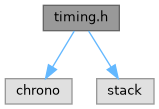Loading...
Searching...
No Matches
#include <chrono>#include <stack>
Include dependency graph for timing.h:

This graph shows which files directly or indirectly include this file:

Go to the source code of this file.
Typedefs | |
| using | Clock = std::chrono::high_resolution_clock |
| using | TPoint = std::chrono::time_point< Clock > |
Functions | |
| auto | tic () |
| double | toc (TPoint const &t_b=MyStopWatch.top()) |
Variables | |
| std::stack< TPoint > | MyStopWatch |
| starting time of stopwatch | |
Typedef Documentation
◆ Clock
◆ TPoint
Function Documentation
◆ tic()
|
inline |
◆ toc()
|
inline |
Returns the elapsed time from stopwatch.
The time point from top of the stack is used if time point t_b is not passed as input parameter. Use as
or as
The last option is to be used in the case of non-nested but overlapping time measurements.
- Parameters
-
[in] t_b start time of some stop watch
- Returns
- elapsed time in seconds.
Definition at line 43 of file timing.h.
Here is the caller graph for this function:

